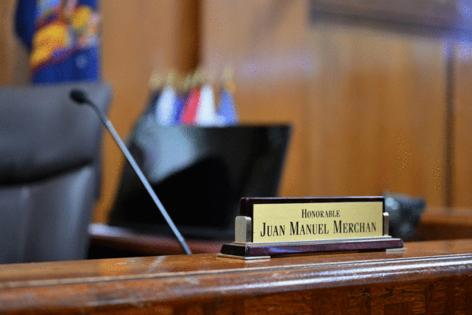NYC judge in Trump hush money case poised to decide whether to uphold guilty verdicts
Published in News & Features
NEW YORK — A Manhattan judge is poised Tuesday to decide whether to let stand the guilty verdicts against Donald Trump stemming from hush money payoffs to Stormy Daniels and others in a 2016 election interference scheme.
State Supreme Court Justice Juan Merchan has said he will rule on Trump’s motion to toss the case based on presidential immunity in an off-calendar decision. It asks him to set aside a jury’s verdict finding him guilty of 34 felony counts of falsifying business records and dismiss the indictment handed up by a separate set of New Yorkers in March 2023.
Should Merchan grant the motion, he may order a new trial, which likely wouldn’t occur for several years following Trump’s election victory, or outright dismiss the case.
Less clear is what will happen if he denies it. Before the election, Merchan said he’d sentence Trump on Nov. 26 “if necessary” on the charges carrying up to four years in prison. Trump’s legal team is sure to challenge the proceeding from going ahead as he positions to retake the White House.
The seven men and five women who declared Trump a felon returned their verdicts on May 30 after hearing from 22 witnesses about a plot to corrupt the 2016 presidential election devised among Trump, his former fixer Michael Cohen and tabloid publisher David Pecker, and then cover it up.
The anonymous jury determined Trump lied about why he was paying hundreds of thousands of dollars to Cohen in 2017 to cover up the plot — claiming a series of checks covered Cohen’s “legal services” when in reality he was reimbursing his then-lawyer for silencing a porn star about a seedy extramarital encounter so voters wouldn’t learn about it.
Trump’s motion, among other arguments, argues that the case presented by prosecutors from Manhattan District Attorney Alvin Bragg’s office violated the U.S. Supreme Court’s July decision on presidential immunity because it included evidence related to his “official acts.”
They say the jury should never have heard from former White House Communications Director Hope Hicks, who testified about Trump privately acknowledging to her in 2018 that Cohen had paid off Daniels before the 2016 election — and “that it would have been bad to have that story come out before the election.”
They have argued that the judge shouldn’t have allowed prosecutors to call as a witness Madeleine Westerhout, Trump’s former Oval Office aide, who testified about how Trump liked to sign things he’d first read himself with “a Sharpie or a felt-tip pen.”
Trump’s lawyers have also argued that tweets that Trump published on his presidential account on Twitter, now known as “X,” about Cohen should have been prohibited.
Prosecutors have opposed the motion, arguing that the hush money scheme “was entirely personal and largely committed before the election, and it had no relationship whatsoever to any official duty of the presidency.”
They say the verdict should stand even if evidence improperly came in because the trial record contains “overwhelming evidence” of Trump’s guilt.
The historic criminal case, one of four brought against Trump after his first term, saw him become the first U.S. president to be convicted of a crime.
The others are unlikely to include a jury’s conclusion, at least in the near future. The Justice Department is reportedly winding down the two federal cases against Trump, and legal experts believe Georgia prosecutors’ case against him is unlikely to see a revival before he takes office.
_____
©2024 New York Daily News. Visit at nydailynews.com. Distributed by Tribune Content Agency, LLC.







Comments